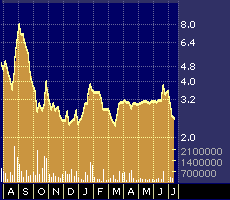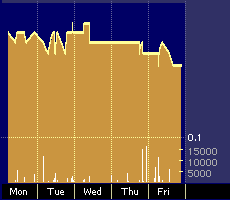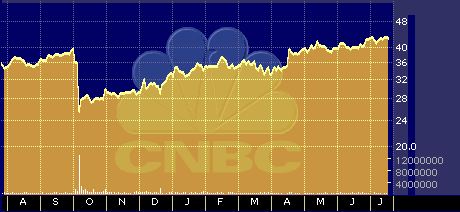
E-Stamp and Stamps.com to Duke It Out
E-Stamp and Stamps.com to Duke It Out
by Hal Plotkin
Silicon Valley Correspondent
Although its stock is up sharply since its IPO, E-Stamp Inc.’s {ESTM} ultimate fate may hinge on what happens after rival Stamps.com {STMP} enters the fray later this month.
“Some customers may find Stamps.com easier to use,” says Bonnie Brooks, principal analyst at Creative Strategies International, based in Campbell, Calif. Brooks, like most analysts, says competition over the coming months will be absolutely critical in determining the fate of the two early contenders in the online-postage market.

STMP performance since its IPO

ESTM performance since its IPO
The competition between them is already quite fierce. Just weeks after introducing its first product, Palo Alto, Calif.-based E-Stamp is already beta-testing a new way of selling stamps that more closely resembles the service Stamps.com plans to roll out.
“It’s wise of E-Stamps to move more in the direction Stamps.com is heading,” says Blaine Mathieu, senior analyst at Dataquest, based in San Jose, Calif. Mathieu says E-Stamp’s recent product-development moves make sense because the company’s current sales strategy, which requires the purchase of additional hardware, “can scare customers away.”
E-Stamp went public on Oct. 8 at $17 a share. The stock has traded at as high as $33.
E-Stamp will soon, however, face a stiff challenge from Santa Monica, Calif.-based rival Stamps.com, which employs a different marketing strategy. Unlike E-Stamp’s product, Stamps.com’s forthcoming service lets users with PCs download and print postage without requiring the purchase of any additional hardware. By contrast, customers buying postage from E-Stamp must buy a $49 hardware security device that plugs into a PC’s printer port.
E-Stamp does plan to make the special security hardware optional by the end of next year. However, in the meantime, Stamps.com will be able to scoop up customers who don’t want to buy any special equipment.
“It’s a clear advantage,” Mathieu says. “Any time you put some kind of barrier in front of people, it dramatically reduces the adoption rate. Stamps.com doesn’t have that problem.”

STMP performance since its IPO

ESTM performance since its IPO
Mathieu’s view, however, isn’t shared by Ray Boggs, director of the small-office and home-office research group at International Data Corp., based in Framingham, Mass.
“I don’t think the $49 set-up charge will hurt E-Stamp at all,” Boggs says. “It’s less than the cost of a cellular phone.”
Boggs adds that his research indicates that small business owners prefer solutions that allow them to store postage on their own machines, which is how E-Stamp’s system operates. “It’s a small margin of users who prefer that,” Boggs says. “But it is important to many of them.”
Unlike E-Stamp’s users, Stamps.com customers must be connected to the Internet whenever they want to use the service, since their postage isn’t stored remotely.
Both services also help users verify addresses before mail is sent out. But again, there are important differences. E-Stamp gives customers a CD-ROM address database which they can use to verify addresses while Stamps.com users can check addresses online through the Internet.
E-Stamp executives say they designed their initial product in response to studies of their target small office/home office market.
“Seventy-one percent of [SOHO] customers share their Internet line with their fax machine” says Nicole Eagan, E-Stamp’s senior vice president for marketing and sales, citing a December 1998 report by International Data Corp. “Those customers don’t want to have to unplug their fax machine every time they want to send a letter. For them storing postage on their local machines is a matter of convenience.”
E-Stamps is, nonetheless, developing a service similar to Stamps.com’s in order to give customers a choice between both options, Eagan says.
Likewise, Eagan says that E-Stamp’s approach to address verification is also designed with customer concerns in mind.
“There are security and privacy issues involved,” Eagan says. She adds that many small business owners don’t want any third party knowing exactly who they’re sending mail to. “Many consider it an invasion of their privacy. We let them check addresses without them having to share private information with anyone else.”
In response, John Payne, Stamps.com’s president and CEO, points to the explicit written promise to never divulge client information to any outside parties that appear on his company’s Web site. “We’re very strict about privacy,” he says.
Payne says his company’s real-time approach to address verification offers several major advantages. Stamps.com users can, for example, automatically verify addresses online whenever they use postage, while E-Stamp users must load a CD-ROM each time they want to access similar services. “Our method is simpler, less cumbersome, and easier,” he adds.
In addition, Payne says postage sales will be boosted because his customers don’t have to purchase any special equipment. “We think of this as a service, not a product,” he says. “I don’t think customers will want to pay an upfront fee if they don’t have to.”
Both companies boast about their marketing deals with third parties. Both have inked a deal with Microsoft Corp. {MSFT}, for example, to include their software on Microsoft’s Office update Web site. The customers of both companies can print stamps onto envelopes, labels, and documents, while using Microsoft Word, Microsoft Outlook, and Microsoft Personal Address Book.
On Tuesday, Stamps.com announced a deal with IBM {IBM} to supply that company with postage, making it easier for people who own IBM laptops and PCs to use the service.
One major concern, though, is how E-Stamps and Stamps.com might fare once industry behemoth Pitney Bowes Inc. {PBI}, which controls 85 percent of the existing postage meter market, starts selling PC postage sometime next year.

PBI one-year stock performance chart
Pitney Bowes recently filed lawsuits charging both E-Stamps and Stamps.com with patent infringement.
“The legal issues appear to be more tactical than anything else,” Mathieu says. “Eventually, though, Pitney Bowes is certain to be a major competitor. And both companies are going to have to worry about that.”


